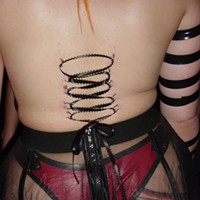Twitch & Shout
They may seem sweet and normal, but Tourette's Syndrome patients can suddenly start twitching, or grunting or cursing without warning. Touretters used to be hanged as witches. Things are better for them now -- people just think they're really weird.
By Sam BoykinPage 2 of 5
"Evenings were typically worst for me because I would try to suppress as much as I could in school," Blake said. "Then when I got home they would all come out."
While Blake and his mom seem to have developed a pretty good sense of humor about Blake's condition, they both acknowledge that it hasn't always been so easy to laugh about it.
"We've had periods that were like nightmares," Catherine said. "There were times when he couldn't get out of bed because his legs were twitching so much. It could be totally debilitating."
For awhile, Blake also experienced hallucinations -- what he describes as little brown men -- which both Blake and his mom believe may have been caused by the number of different medications he was taking for his disorders.
"He would wake me up in the middle of the night and be huddled in the corner of his room scared to death. It was just horrible. I would have to go up and sleep with him.
"Sometimes it's hard to be with Blake," she continued. "As the parent of a child with Tourette's, it's difficult to figure out when they're just testing your limits, or when it's the disorder. When the verbal tics started, he used to call me a fat ass bitch all the time. So it's a fine line -- is the Tourette's causing him to do it, or should you turn around and slap him?"
"How about it, Blake," I ask him. "Is there any of that going on?"
"A little bit," he says, with a sheepish grin.
Why Do You Act Like That?
Most of us perceive people with TS as someone who flails about violently and shouts obscenities. This image has been created largely by talk shows, which usually feature only the most extreme cases. Many doctors even posit that the young people who appear on these shows -- perhaps a little enamored by the spotlight and cameras -- may be trying to "one-up" their fellow talk-show panelists. However, TS is a disorder whose more severe symptoms can be quite bizarre and hard to ignore. This may explain why in the Middle Ages, people with Tourette's were often thought to be possessed by demons. Some medical historians believe that some of the women hanged in Colonial Salem may have been afflicted with Tourette's. It wasn't until 1825 that the first case of TS was reported in medical literature with a description of the Marquise de Damdispierre, a noblewoman whose symptoms included numerous physical tics and various vocalizations. Later Dr. Georges Gilles de la Tourette, the French neurologist for whom the disorder is named, described several cases in 1885.
For many decades it was theorized that TS was caused by everything from mental illness to bad parenting. Today, while the basic cause of TS is still unknown, current research suggests that there is an abnormality in the gene(s) affecting the brain's metabolism of neurotransmitters such as dopamine and serotonin. Neurotransmitters are chemicals in the brain that carry signals from one nerve cell to another.
A diagnosis of TS is often made after a process of elimination -- usually via blood tests and brain scans that rule out other possible disorders -- and after observing the symptoms and evaluating family history.
"Typically TS begins to manifest itself in the face and head, with lots of eye blinking and throat clearing," said Dr. Donna Dillon-Stout, a clinical psychologist who specializes in pediatrics. "As the disorder progresses, it might move into the shoulders, arms, trunk and legs. So the more severe the disorder, the farther down the body it moves. If an adolescent is only having symptoms involving the face, such as humming, throat clearing or sniffing, that's probably as bad as it's going to get. It's that four-year-old who has complex motor tics involving more than the face that you know is suffering from a budding severe case."
Tics are classified as simple or complex. Simple tics are sudden, brief movements that involve a limited number of muscle groups, such as eye blinking or shoulder shrugging. Complex tics are distinct, coordinated patters of successive movements or behavior such as jumping, smelling, touching other people, coprolalia (involuntarily shouting obscenities), or echolalia (repeating the words of others). While symptoms like coprolalia and echolalia are often focused upon, only a small percentage of people with TS exhibit that type of behavior.
A patient has to exhibit both motor and vocal tics for at least six months to be officially diagnosed with TS. Because the behavioral symptoms and tics are easily misinterpreted and misunderstood, though, this can often be a tricky and delayed process.
Latest in Cover
More by Sam Boykin
-

Divine evolution
Nov 11, 2015 -

The Agony & The Ecstasy
Jun 21, 2012 -

'Dynamite' diet with nutritionist Angela Gallo
Jan 18, 2011 - More »
Calendar
-

Queen Charlotte Fair @ Route 29 Pavilion
-

NEW WINDOW GALLERY-Pat Rhea-ACRYLIC PAINTINGS-April 05-30 2024 VALDESE, NC 28690 @ New Window Gallery/Play It Again Records
- Through April 30, 12 p.m.
-

TheDiscountCodes
-

Wine & Paint @ Blackfinn Ameripub- Ballantyne
-

Face to Face Foundation Gala @ The Revelry North End










